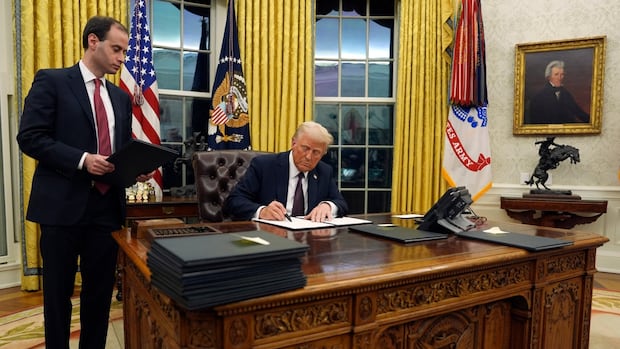Trump postpones TikTok ban. Was it legal?
US President Donald Trump on Monday, his first day back in office, signed an executive order delaying the country’s ban on TikTok for 75 days. But whether this step is legal or not is up in the air.
The ban, enacted by the Biden administration and upheld by the Supreme Court, gave Chinese parent company ByteDance until Sunday to sell its stake in the popular social media platform or face a US ban.
Lawmakers on both sides of the aisle have argued that TikTok could be used by the Chinese government to spy on US citizens.
But there are few signs that Trump has the authority to overturn the law.
“Executive orders cannot override existing laws,” said Sarah Kreps, director of Cornell University’s Technology Policy Institute.
The law has a provision that allows for a 90-day extension if there is progress toward a sale before the effective date. The app was blacked out in the US on Saturday evening, but was restored the next day, with a message to US users that the company was working with the Trump administration to find a solution.
Chinese social media app RedNote recently came under the spotlight after more than half a million TikTok users joined the platform to protest an imminent ban on the short-form video app that will take effect in the United States on Sunday. Technologist Jason Snyder said RedNote could “track or exploit users,” adding that the real danger comes with its “ability to control narratives.”
Given that the law was already in place when Trump signed the executive order, Kreps says, the provision is even less likely to apply retroactively.
“It is not clear that the new president has the authority to issue a 90-day extension of the law that has already been enacted,” he said.
It also doubts the existence of any delay clauses at this point – without even a potential buyer’s name to prove the sale is ongoing. Various media reports have speculated that Tesla and SpaceX CEO Elon Musk will buy the platform, or that Mark Zuckerberg will be interested in Meta.
who is Trump previously opposed TikTok’s existence He told reporters in the United States that he changed his mind after using the program himself.
Meanwhile, TikTok continued to operate as usual in Canada and elsewhere.
First amendment issue
Anupam Chander, a law professor at Georgetown University, said the Supreme Court treated the TikTok ban as a First Amendment issue and looked at whether the law violated TikTok or its users’ right to free speech.
The court is “not judging the substance of the law. It’s not judging the timeline of the law. It’s just saying, does Congress have the authority to pass this law?” He told CBC News.
Confusion with Elamin Abdelmahmoud25:00The uncertain future of TikTok and Severance season 2
It ultimately ruled the law unconstitutional, citing Congressional concerns about the app’s data collection.
Chander, an expert on the regulation of new technologies, says Trump’s postponement of the ban could be challenged in court, though he adds, “It’s unclear who will make the challenge in the U.S. courts.”
According to him, this is an example of the “danger” created by executive orders.
“If you can say, ‘Hey newspaper, you’re going, I can decide your fate in this country,’ it makes the newspaper very docile, to say the least.”
That was part of the Supreme Court’s argument in a separate, broader case about social media platforms. in July, When Florida and Texas argued that the government should limit how it regulates content posted by users of these platforms.

The court issued an opinion arguing that platforms, like newspapers, should be protected from government interference in determining what is included or excluded from virtual space.
U.S. Representative Frank Pallone, a Democrat from New Jersey, offered He said Trump’s move was illegal and that the newly sworn-in president was “circumventing national security legislation passed by a bipartisan majority in Congress.”
House Speaker Mike Johnson, a Republican, did not comment on the legality of Trump’s move, but said he expected a full sale.
But Trump may have other plans, suggesting to reporters on Monday that the government could strike a deal with ByteDance to buy a 50 percent stake in TikTok. Another potential obstacle is Beijing protecting TikTok in the face of US threats.
However, China’s vice president met US Vice President JD Vance and Musk on Monday after attending Trump’s inauguration, which was also attended by TikTok CEO Chew Shou Zi.
If the sale goes through, the partially US-owned version of TikTok will be cut off from the rest of the world, unlike Chinese social media platform Douyin, its TikTok-like sister app that operates only in China. only for Chinese market.
Those optics may not bode well for the United States, Chander says.
Douyin only operates in China because it is “a very heavily censored environment,” he said. “And that’s not what we usually do in the United States.”
“Canadians would refuse to talk to the rest of the world, and Americans would refuse to talk to us. It’s not a good look for the United States, and it’s not good for the rest of the world.”








